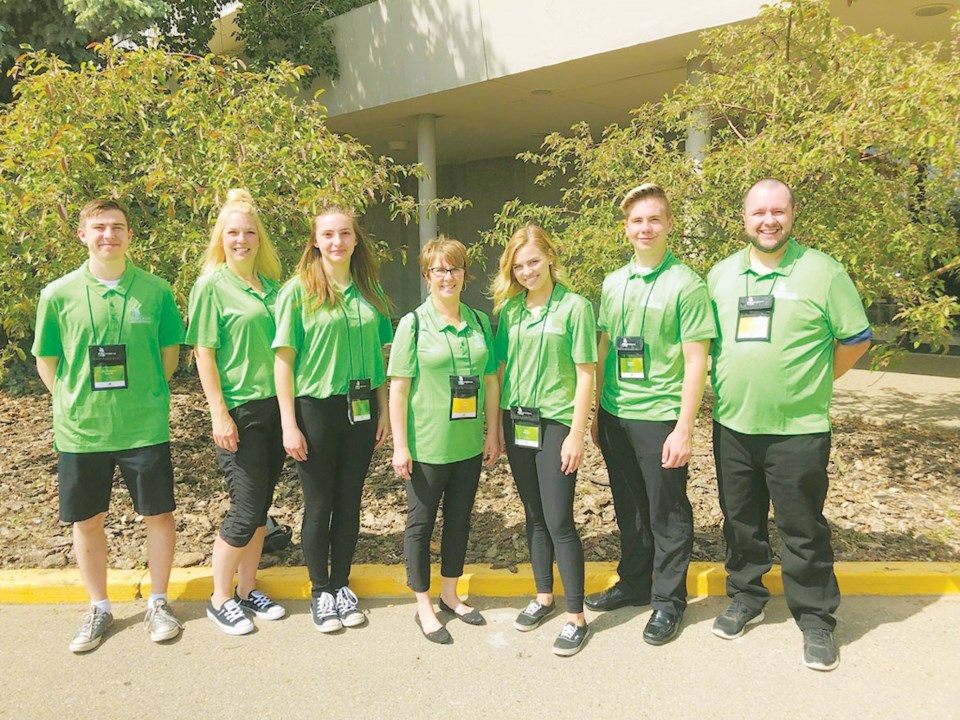Two students from the Estevan Comprehensive School (ECS) came away with medals from the Skills Canada national competition that was held in Edmonton recently.
Eric Swirski and Hunter Ruel, both Grade 12 students at ECS, won bronze medals at nationals in Edmonton. The competition dates were June 4 and 5, and the results were announced on June 6.
Swirski won bronze at mechanical computer-aided design and drafting (CADD), while Ruel took bronze in architectural CADD.
Also competing were Ricki Graham (hairstyling) and Hunter Wallster (precision machining).
For Swirski, it was the second straight year he has won a bronze medal at nationals. He believes the experience from a year ago helped out a lot.
“The biggest thing is just being there and how intense it is,” said Swirski. “Having that experience already just made it so much easier for me to get into my zone and get comfortable.”
Four different projects were assigned to the mechanical CADD competitors at Skills Canada. The first day of competition saw him work on the housing for the headlight of a Jeep, in which he had to take apart and measure the housing. He also had to assemble the right and left wheel assembly for a rover.
During the second competition day, he had to use blueprints to design a coffee cup, and he had to create the front bumper of a Jeep.
Getting ready for Skills Canada requires a lot of work, he said. His teacher, Tara Johns, was a big help.
“Most of my practice was with her, and any time that I needed any questions, I was free to ask her, so she was a lot of help,” said Swirski.
The projects this year were more difficult, but he believes he was well-prepared.
Swirski will be studying aerospace engineering, which links closely with mechanical engineering, at Carleton University this fall. He expects the things he learned at Skills Canada will help a lot with his studies.
“What I’m going into is going to use a lot of the skills I learned at Skills Canada, but also the time management, and doing a project under pressure is going to really help,” said Swirski.
Ruel, meanwhile, said it was a “nerve-racking” experience because of the people she was competing against.
“You’re excited about what they know, and there are other people in the same trade as you, and it’s a competition, so those are always exciting,” said Ruel.
The other people at nationals were very talented, and it was harder than provincials, not only because of the talented young people competing, but because of the timeframe. Skills Canada was a two-day competition, while provincials were just one.
During the first day, she was given a blueprint, which she had to remake.
“Then our client had made changes on it, and so we had to mimic the changes, and then we had to … make a full working blueprint of all the new stuff,” said Ruel.
For the first project on the second day, they had to add a basement and calculate the dimensions with the reworked floor plan. Then they had to work on a wall section.
“If you cut a wall in half, you had to hand-draw all the layers that are inside the wall,” said Ruel.
She believes she did well in the hand-drawn wall section, and with the changes the client wanted.
“I think I made a really great flow for it, and my labelling and dimensions were really great,” said Ruel.
She said she had to dedicate a lot of time preparing for nationals, after already spending a lot of time getting ready for provincials.
She said Johns was a big help, because of her knowledge and experience.
Ruel is interested in a career in architecture, and she looks forward to studying it at Saskatchewan Polytechnic.
Johns said she was very impressed with the efforts of the students. The level of competition was very tough, and the difficulty level of the projects was augmented, since it’s a qualifying year for the global competition.
“Everything comes down from the worlds level to nationals and then to provincials, so everything had a higher level of difficulty that the students had to compete towards.”



